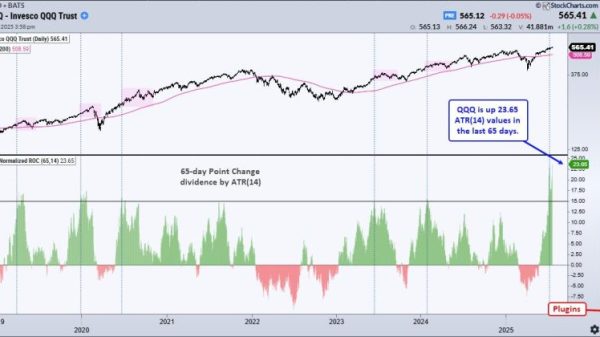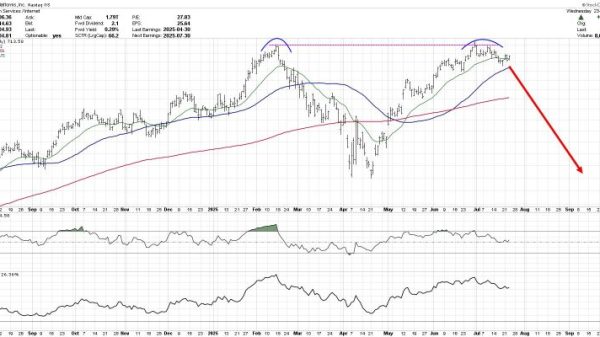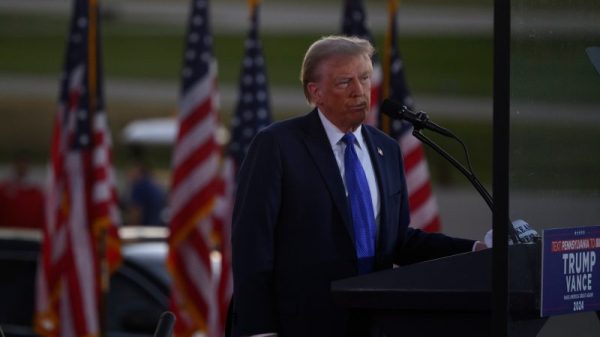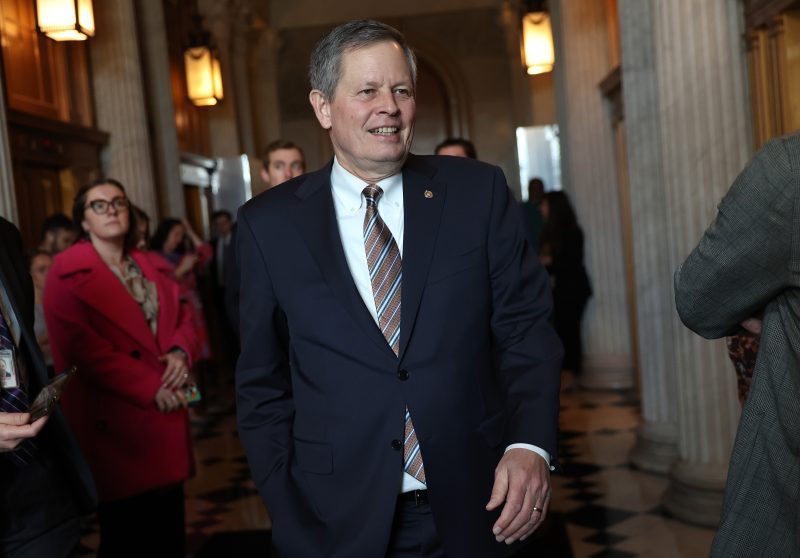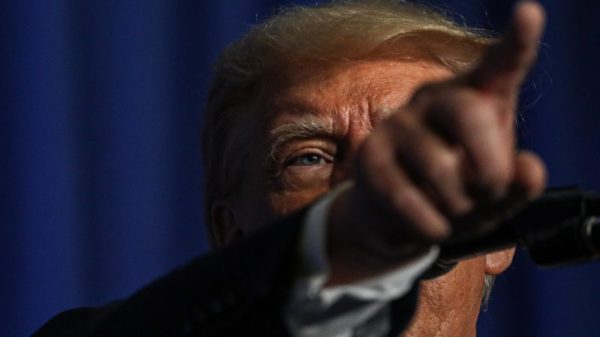Former president Donald Trump and Republican candidates in key Senate races voiced support for in vitro fertilization treatment Friday, distancing themselves from a recent Alabama Supreme Court ruling that has again highlighted the electoral challenge Republicans face over their stances on abortion and other reproductive rights.
The Alabama court’s decision last week — that frozen embryos should be considered children and that people can be held liable for destroying them — initially was met largely with silence from Republican officeholders and candidates. But many Republican politicians have since sought to embrace IVF procedures, which have been utilized by thousands of families in the United States.
Since the U.S. Supreme Court’s Dobbs v. Jackson Women’s Health Organization ruling in 2022, which overturned the federal right to an abortion, Republicans have struggled to find a winning electoral strategy to address reproductive rights, particularly abortion. Last November, abortion rights played a role in a string of GOP losses across the country, and voters have rejected every opportunity to limit abortion care in several referendums, including in red states. Some Republicans, meanwhile, have continued to push for a federal abortion ban.
Friday’s expressions of support for IVF from Republicans came after the National Republican Senatorial Committee, the national group tasked with electing Republicans to the Senate, urged its candidates on the ballot this year to support IVF and reject government restrictions, citing the procedure’s popularity.
“When responding to the Alabama Supreme Court ruling, it is imperative that our candidates align with the public’s overwhelming support for IVF and fertility treatments,” NRSC Executive Director Jason Thielman wrote in a memo to “Senate Candidates” dated Friday and obtained by The Washington Post.
Democrats have signaled that they plan to leverage the ruling in the 2024 elections. The White House and the Biden reelection campaign have placed the blame on Trump and the Supreme Court’s decision. And the IVF issue is already becoming fodder for campaigns and fundraising groups.
Democratic Senatorial Campaign Committee spokesman David Bergstein said in a statement Friday, “The fact that the NRSC had to tell their candidates how unpopular their own agenda opposing women’s reproductive freedom is speaks for itself.”
Thielman described the Alabama ruling as “fodder for Democrats hoping to manipulate the abortion issue for electoral gain” and said that “there are zero Republican Senate candidates who support efforts to restrict access to fertility treatments.”
“NRSC encourages Republican Senate candidates to clearly and concisely reject efforts by the government to restrict IVF,” he wrote.
The NRSC memo cited polling that appears to have been conducted by the firm of former Trump White House adviser Kellyanne Conway and that claimed that access to IVF is overwhelmingly popular. Much of the Republican Party for years has embraced the argument that life begins at conception, making that a cornerstone of GOP opposition to abortion. But the decision in Alabama has injected urgency into a debate that had been on the back burner.
On Friday, Republican Senate candidates Bernie Moreno and Matt Dolan in Ohio, Tim Sheehy in Montana, Dave McCormick in Pennsylvania, Kari Lake in Arizona, Mike Rogers in Michigan, and Sam Brown in Nevada were among those who posted messages on social media saying they support IVF. At least one Republican running for Senate, former Maryland governor Larry Hogan, expressed support for IVF before the NRSC memo was issued.
The memo did not explicitly dictate how candidates should discuss personhood and embryos — an issue at the heart of the Alabama case — and instead focused largely on messaging that emphasizes promoting the expansion of families.
Still, the chair of the NRSC, Sen. Steve Daines (R-Mont.), has co-sponsored several antiabortion bills. In 2021, he co-sponsored the Life at Conception Act, which would provide equal protection under the 14th Amendment “for the right to life of each born and preborn human person.” The bill also defines “human being” to “include each member of the species homo sapiens at all stages of life, including the moment of fertilization or cloning, or other moment at which an individual member of the human species comes into being.”
Rep. Elissa Slotkin (D-Mich.), who is running for a Senate seat in Michigan, argued in a tweet Friday that Rogers, her possible general-election opponent, had previously co-sponsored four bills in Congress “that would have the same effect as the Alabama Supreme Court’s IVF ruling.”
In Pennsylvania, the state Democratic Party said that “McCormick has touted his support for an abortion ban with no exceptions for rape or incest and praised the Dobbs decision over and over again — he can’t be trusted to protect Pennsylvania women’s rights.”
House Majority PAC, a political group dedicated to electing more Democrats to the U.S. House of Representatives, relayed in a memo Friday that House Republicans’ support for the Life at Conception Act “will be used against them over paid media in competitive House districts across the country this fall.”
“While some House Republicans may pretend to oppose the ruling, their support tells a drastically different story,” the memo said. “The fact is that ANY vulnerable House Republican who co-sponsored the Life at Conception Act supported putting IVF and fertility treatments at risk.”
Trump has previously said he was “proud” of his role in overturning Roe v. Wade, the landmark Supreme Court decision that protected the right to an abortion. (He appointed three justices, ensuring a conservative majority on the court.) But in a social media post Friday, he said, “I strongly support the availability of IVF for couples who are trying to have a precious baby,” and he subsequently called on the Alabama legislature “to act quickly to find an immediate solution to preserve the availability of IVF in Alabama.” He reiterated his support during a speech Friday evening in Rock Hill, S.C., ahead of Saturday’s Republican presidential primary there.
Even as Trump and lawmakers distanced themselves from the ruling, national and state-level antiabortion groups celebrated it, though most still indicated they were proceeding with caution.
“This is an issue that a lot of folks have not anticipated since Dobbs and that we are grappling with,” Steve Aden, chief legal counsel for the national antiabortion organization Americans United for Life, said Thursday. His group years ago drew up model legislation to limit the number of embryos created per IVF cycle, and he said he hoped state lawmakers might consider it.
In a subsequent interview Friday, Aden told The Post that he wished Trump “would express a more thoughtful opinion that is based on an understanding of the IVF process and the need for respect for human life throughout it,” adding: “I wouldn’t say I’m at odds with the president’s decision; I guess I’m about halfway there. He needs to understand the issue more fundamentally.”
“The ethical approach to IVF is to ensure that human lives are not wantonly created and destroyed in the process,” he continued, saying that he shared Trump’s hope Alabama lawmakers would act on the issue but that the legislation should express “respect for life.”
Kristan Hawkins, the president of Students for Life, wrote on X: “President Trump, the pro-life movement recognizes what science tells us — at conception a unique, valuable human being comes into existence. We need strong families & more babies. But we need to have a convo about babies who are being killed in IVF clinics.”
Advocates on both sides of the issue said they were not aware of any states that were immediately poised to follow in the steps of Alabama through the courts. But the Alabama decision sparked uncertainty for fertility treatment patients and providers in that state.
Alabama Attorney General Steve Marshall (R) “has no intention of using the recent Alabama Supreme Court decision as a basis for prosecuting IVF families or providers,” his chief counsel, Katherine Robertson, said in a statement.
Republican and Democratic lawmakers in the Alabama legislature have been working to introduce legislation protecting access to IVF following the state Supreme Court’s ruling. House Minority Leader Anthony Daniels (D) filed a bill Thursday stating that a fertilized human egg or embryo outside a uterus will not be considered a person “for any purpose under state law.” Sen. Tim Melson (R) has said he plans to file a bill clarifying that embryos are not viable until they are implanted inside a uterus.
The Alabama ruling has led Sen. Tammy Duckworth (D-Ill.) to renew a call for Congress to pass a bill she introduced that would establish a statutory right to access IVF and other assisted-reproductive technology services nationwide.
The White House so far has not expressed approval for Duckworth’s bill. When asked whether the White House was considering policies or executive orders in response to the Alabama ruling, press secretary Karine Jean-Pierre said the solution was to reinstitute the federal abortion protections that were overturned in 2022.
“The fix here is Roe v. Wade,” Jean-Pierre said during Friday’s press briefing. “That’s how we get to a place where we fix what’s going on and stop the chaos that we’re seeing in these states. That’s the fix. It’s a legislative fix that needs to come from Congress.”
Marianne LeVine, Justine McDaniel, Dan Rosenzweig-Ziff, Isaac Arnsdorf and Yasmeen Abutaleb contributed to this report.






